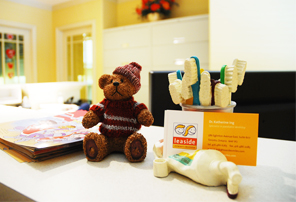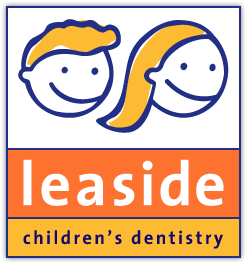Frequently Asked Questions
Here are commonly asked questions. If you do not find the answer to your question, please do not hesitate to contact us.


General Questions
What is the difference between a pediatric dentist and a family dentist?
When should my child start seeing the dentist?
How often does my child need to see the pediatric dentist?
Can thumb sucking be harmful for my child's teeth?
What is baby bottle tooth decay and how can I prevent it?
How can I prevent Early Childhood Caries?
How should I clean my baby's teeth?
When should my child start using toothpaste?
Office Policies
How do I pay for my child's first visit?
Does Leaside Children's Dentistry accept my insurance?
What are your late and cancellations policies?
What is the difference between a pediatric dentist and a family dentist?
Pediatric dentists are specialists in dentistry focusing on the unique oral health needs of children. Most pediatric dentists have two or three years of additional, specialty training which is obtained after they have already completed a four year dental school curriculum to become a family dentist. These extra years of study and hands-on training specific to children and adolescents, allows the pediatric dentist to become experts in dealing with the dental and emotional needs of infants, children and adolescents, and those with special health care needs.

When should my child start seeing the dentist?
“First visit by first birthday” is a good rule of thumb. Treat the first dental visit as you would a well-baby checkup with the child’s physician. It is beneficial for your child to start seeing the dentist no later than the age of one when teeth have begun to grow into the mouth. This visit is a pleasant way of introducing the dentist and dental team and establishes a dental “home” for your child. Early examination allows us to assess your child’s health and overall dental development. We can determine if the new teeth are normal, see if any cavities are starting (yes already!) and also recommend ways to effectively take care of your child’s teeth at home. The appointment is tailored to your child’s needs and provides information on what to do in the event of a dental emergency, identify dietary concerns, and how to recognize symptoms of decay and pain.

How often does my child need to see the pediatric dentist?
How often we will want to see your child varies with their individual needs. To maintain optimum dental health and to detect problems early, regular visits are recommended at six month intervals for most children. Regular visits provide a better opportunity to detect small problems before they become big ones. Some children need more frequent dental visits because of increased risk of tooth decay, unusual growth patterns or poor oral hygiene. Diet, medications, medical conditions, appliances (such as braces), habits, and home care, are all factors that affect the frequency that we will want to see your child. We will work together to determine an appropriate appointment schedule for your child.

Can thumbsucking be harmful for my child's teeth?
Thumb sucking is perfectly normal for infants because it offers security and comfort. Most children stop sucking their fingers and thumbs between two and four years of age. Prolonged thumb sucking can create crooked teeth or bite problems. If the habit continues beyond age three, a professional evaluation is recommended. Thumb and pacifier sucking habits will generally only become a problem if they go on for a very long period of time. Most children stop these habits on their own, but if they are still sucking their thumbs or fingers when the permanent teeth arrive, a mouth appliance may be recommended to assist in curbing the habit.

What is baby bottle tooth decay and how can I prevent it?
Your baby's teeth are at risk for Early Childhood Caries (formerly referred to as Nursing Bottle Syndrome or Baby Bottle Tooth Decay) if their teeth are exposed to any liquid containing sugar including milk, formula and juice for extended periods of time. This happens most often when babies fall asleep with a bottle in their mouth or a small amount of formula or breast milk remains in their mouth after falling asleep. It can also happen with pacifiers that have been dipped into sweet liquids such as honey or syrup.
What seems like harmless, healthy food can turn to destructive acid by the oral bacteria in the child’s mouth and cause cavities (tooth decay). The most common teeth to be affected are the upper anterior (front teeth) since they are some of the first teeth to emerge and therefore have longer exposure to the acid from the sugar.

How can I prevent Early Childhood Caries?
Avoid nursing children to sleep or putting anything other than water in their bed-time bottle. Also, learn the proper way to brush and floss your child's teeth.
Take your child to a pediatric dentist regularly to have his/her teeth and gums checked. The first dental visit should be scheduled by your child's first birthday.
Use the bottle for nutrition only and not as a habit. Do not allow a child to fall asleep with milk, breast milk or formula in their mouths.
Give your child water when they are thirsty.
Wean your baby from the bottle to a cup by the time they are one year old. You can dilute or water down the liquids gradually over time until there is only water given in the bottle.
Have your dental hygienist or dentist look at your baby’s teeth regularly from the time the first tooth emerges.

How should I clean my baby's teeth?
Use a damp gauze or washcloth to wipe a sleeping child’s teeth and gums and brush your baby’s teeth daily from the time the first tooth erupts. This will help to remove the harmful bacteria that convert the sugars to acid. As soon as the teeth begin to appear, start brushing twice daily using fluoridated toothpaste and a soft, age-appropriate sized toothbrush.

When should my child start using toothpaste?
As soon as the teeth begin to appear, start brushing twice daily using fluoridated toothpaste and a soft, age-appropriate sized toothbrush. A “smear” of fluoridated toothpaste (the size of a kernel of rice) is appropriate for children less than two years of age and a “pea-sized” amount of fluoridated toothpaste is appropriate for children aged two through five years of age. Remember that young children do not have the ability to brush their teeth effectively.

How do I pay for my child's first visit?
To help keep dental fees as affordable as possible, we do not bill or extend credit. Full payment will need to be made for the services rendered at the end of each visit. For your convenience, we accept cash, VISA, MasterCard or debit (Interac) card. Personal cheques are not accepted.

Does Leaside Children's Dentistry accept my insurance?
We would be pleased to assist you with your insurance claims, either by sending the information to the insurance companies electronically, or by providing you with a printed insurance claim form for submission. Regretfully, we do not accept payment from the insurance companies directly.

What are your late and cancellations policies?
We make every effort to schedule appointments for your convenience. Generally we schedule younger, more anxious patients earlier in the day to give our staff more time to spend with each child on an individual basis. To help us maintain an on-time schedule, we ask that you be on time for your appointment.
If you need to reschedule an appointment, please give our staff 48 hours notice so that we can offer the time slot to another child. Cancellations without sufficient notice will result in a charge.
For those who arrive late, we will try to accommodate your child’s appointment into the schedule if time permits, but please understand that the appointment may need to be rescheduled for another day.


